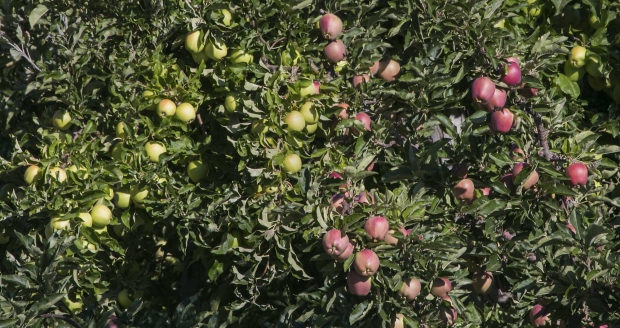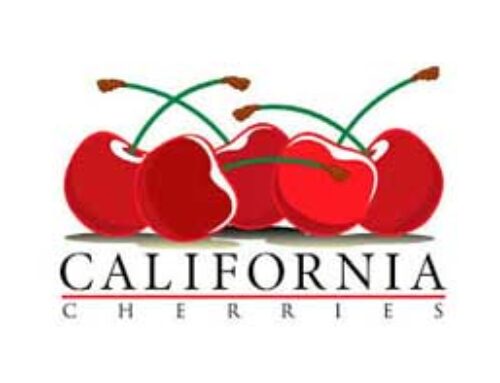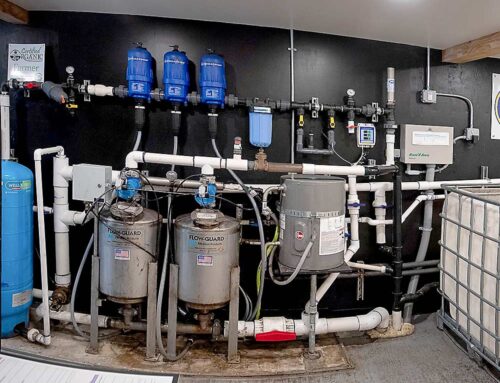
Different varieties of apples growing in a Gleed, Washington orchard in July are expected to be part of a very large 2014 crop. (TJ Mullinax/Good Fruit Grower)
Washington State orchardists expect to harvest 140 million boxes of apples this fall, almost 10 percent more than ever before and 20 percent more than last season.
But the record crop did not take the industry by surprise, says Dan Kelly, assistant manager at the Washington Growers Clearing House Association. Packers have been gearing up to handle larger volumes.
Washington growers enjoyed a fairly trouble-free growing season except for some extreme summer heat, Kelly said. And the 2012-13 marketing season went well, leaving just 8 million boxes out of the total 115-million box crop still to ship as of the first week of August.
“That’s a good number for us to still have fruit on the shelf until the new crop comes in,” Kelly said.
However, there could be some challenges on the marketing side.
Russia recently announced it is banning imports of fruits and other foods from the United States, the European Union, Canada, Australia, and Norway for one year in retaliation for sanctions placed on it by the West.
Todd Fryhover, president of the Washington Apple Commission, said though Washington only ships about 600,000 cartons of apples annually into Russia, the impact of the ban will be felt.
First of all Russia takes large apples, typically in the 64 to 80 size range, whereas most other export markets like smaller apples, and it’s a market for mainline varieties, such as Red and Golden Delicious and Granny Smith.
“So it does play a very key role in the export side,” Fryhover said.
In addition, the European apple crop is forecast to be up 9 percent this year from last. With the Russian market closed, producers will be looking to export into other markets, such as the Middle East or Southeast Asia, where they’ll compete directly with Washington apples. Poland alone would normally ship around 36 million boxes to Russia.
Washington Red and Golden Delicious apples have been shut out of China for the past two crop years because of Chinese concerns about decay problems. It’s expected that the market will reopen for the 2014 crop, but there are still uncertainties about the export protocol, which is far more stringent than the last one. A Chinese official is scheduled to visit Washington packing houses in mid-September.
“I think there are shippers who feel they need to do it and shippers who feel the protocol is so complex that can’t do it,” Fryhover said.
The United States is still negotiating access to China for all apple varieties.
Kelly noted that this year’s 140 million boxes is only a 9 percent increase over two years ago when Washington had an extremely successful season with record volume and record prices. However, that was the year that other U.S. growing regions, including Michigan and New York, lost most of their crop because of spring freezes. This year, all U.S. apple growing regions are expecting a full crop.
“It’s not going to be like the 2012 crop when we had a huge crop and everyone else was down,” Kelly said.
But Fryhover sees cause for optimism in the numbers. Organic production has increased by almost 33 percent to 9.6 million boxes, but there’s strong demand for that in the domestic market.
Honeycrisp production will be up this year by 73 percent to 7.8 million boxes. Again, This is no cause for concern, he said, because of the high demand for the variety.
Fuji will be up 40 percent from last year at 20 million boxes, about the same volume as two years ago. This is good news, Fryhover says, because this season there weren’t enough Fujis to satisfy Taiwanese buyers. The highest demand is for the new, higher-coloring strains of Fuji, which make up an increasing proportion of the crop.
Washington will produce a record Gala crop of 30 million boxes this season, but it’s a variety that’s popular in both international and domestic markets.
“Having more of a good thing is not necessarily a bad thing,” Fryhover commented.
Red Delicious apples will be up 11 percent from last year and Golden Delicous up 34 percent, though both are down slightly from two years ago.
Fryhover said more Red Delicious need to be exported. Traditionally about half the crop has gone to international markets. “This year, we need to be targeting between 60 and 65 percent on the export side,” he said. “Nobody competes with us on Red Delicious. Ours are the best, and they’re the flagship of the Washington apple industry.”
Fryhover said his staff have export promotion programs ready to go to support the Washington apple industry. “But on the political side of the deal, I don’t know….”
Kelly said he could not speculate on how these factors would affect apple pricing in the coming season. “We have no idea what the markets are going to do. It’s the markets that drive prices.”






Leave A Comment